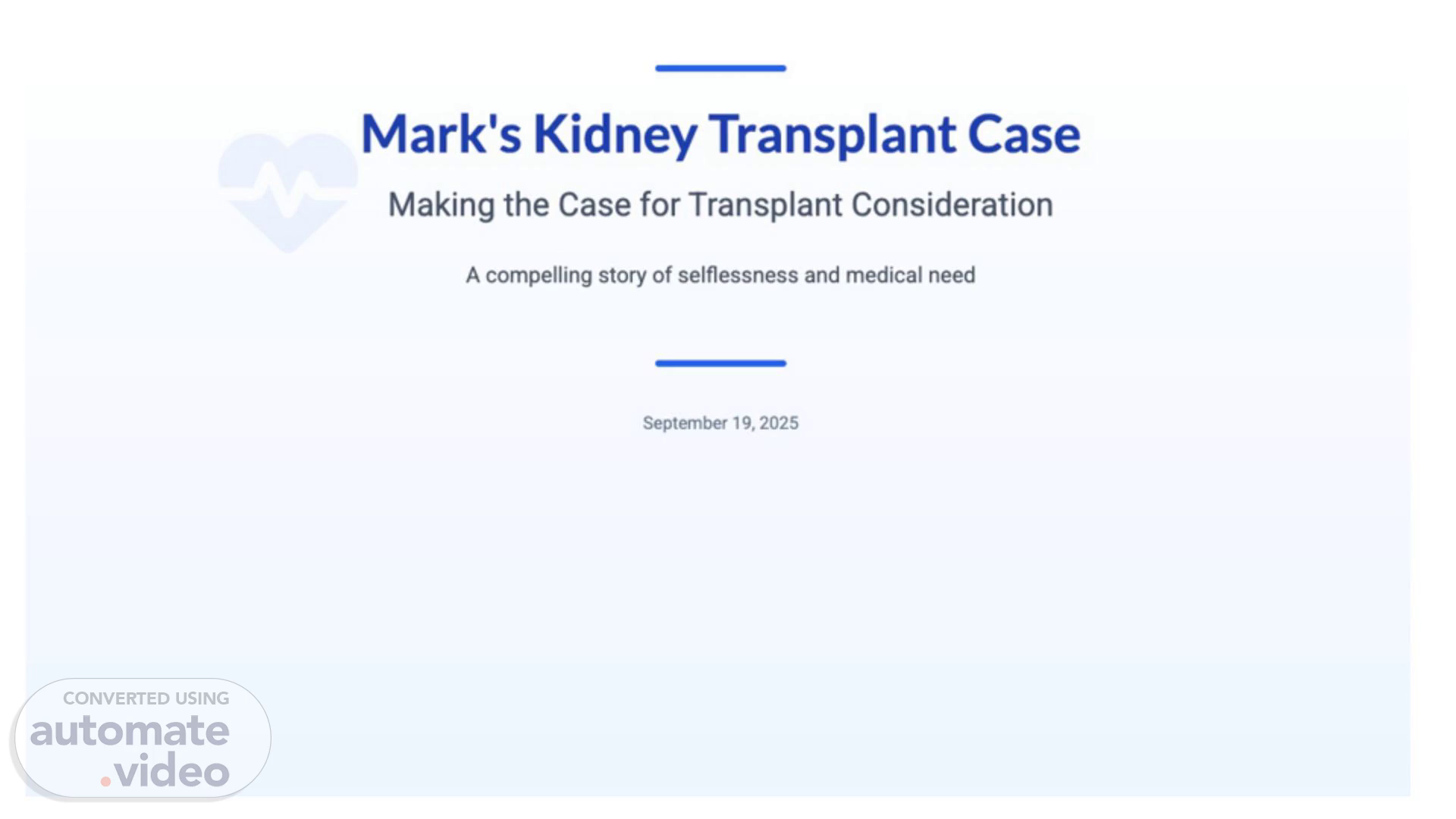Scene 1 (0s)
[image] Mark's Kidney Transplant Case Making the Case for Transplant Consideration A compelling story Of selflessness and medical need September 19, 2025.
Scene 2 (9s)
[image] Background: Mark's Selfless Donation Fifteen years ago, in his twenties, Mark made the extraordinary decision to donate one Of his kidneys to save his brother's life. Fully aware of the risks, he prioritized his brother's health over his own. That act of generosity is the reason his brother is alive today. •A selfless act that demonstrates the extraordinary lengths one would go to save a loved one. • Selfless Act Mark to his brother.
Scene 3 (30s)
[image] Current Situation: Mark's Health Mark now faces kidney failure himself, a critical health challenge that requires immediate attention. His only remaining kidney is beginning to fail, putting him in a vulnerable medical position. Unlike many others, Mark has already made a sacrifice that most people will never be asked to make. •The current situation presents both a medical urgency and an opportunity to honor Mark' past selflessness. • Current Medical Status Kidney FutEtion: Declining Medical Need: Urgent with Transplant: Excellent x Time-sensitive s itu ation.
Scene 4 (52s)
[image] Moral & Ethical Considerations Mark's current need is not only medical but also moral. He gave life to another, and now deserves the chance to have his own life sustained. Granting him a transplant honors his past generosity and acknowledges his previous sacrifice. A transplant for Mark represents: Recognition of his selfless act • Reciprocity for his prior sacrifice • Fairness in medical resource allocation principle of Reciprocity Those who give should be recognized when they are in need. Principle Of Justice Fair consideration should be given to those Who have already sacrificed. principle of Fairness prioritizing those who have contributed to the welfare of others. I •Ethical considerations must account for a patient's history Of semessness and persona/ sacrifice in the context of organ donation:.
Scene 5 (1m 21s)
[image] Medical Rationale for Early Transplant Mark is still relatively early in the progression of his disease, presenting an optimal window for intervention. A transplant now could offer him long-term stability and a strong recovery trajectory. This timing would maximize the use of the donor kidney by placing it with a candidate who is well-positioned to benefit go year? year3 year' years year 7 Eely Stage Late 9 year for many years. x Early Intervention Better outcomes with proactive Comparative IC—year graft survival rates based on disease progression at time Of transplant Optimal Recovery Stronger health foundation for healing Resource Optimization Maximum benefit from donor kidney Long-Term Outlook Extended quality of life potential •Early transplantation in suitable candidates not only improves individual outcomes but represents optimal stewardship of limited donor resources. •.
Scene 6 (1m 51s)
[image] Conclusion: Mark's Compelling Case Mark has already demonstrated exceptional selflessness through his past kidney donation. Granting him this kidney would honor his sacrifice and ensure he receives the same chance at life that he once gave to his brother. His case is compelling both medically and ethically: • Early disease stage maximizes transplant benefit • Proven record of responsible health decisions • Ethical consideration for his past selfless donation Ethical Consideration Medical Rationale Compelling Case •Mark is not just a patient in need he is someone who has already given the gift of life. This transplant would recognize his past sacrifice while providing him the same opportunity for life he once gave to another. •.
